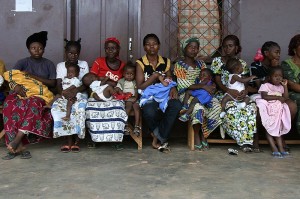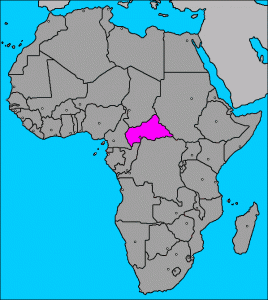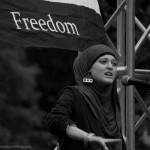
in the Central African Republic, 2008
Image: hdptcar
I’m writing this post for one very important reason: to try to draw attention to the Central African Republic, whose current humanitarian crisis following a coup d’état has had almost no coverage in US media. There are many people at Patheos involved in international health care outreach, and I would like as many as possible to see what is happening in the Central African Republic. The civil war displaced hundreds of thousands of villagers in the last few months, leaving them with no medical support during a malaria epidemic, and in many cases, without food as well. [Update, July 14: Reader heartforafrica has pointed out a new White House petition for a response from the Obama administration, which I encourage you to consider signing and/or spreading through social media. See comment, below.]
The following video is from Médecins Sans Frontières (MSF; Doctors Without Borders):
Yesterday, the European Union pledged some $20 million in aid over the course of this year, but that will come nowhere near the amount of money necessary to provide even basic support services for the inhabitants of the Central African Republic. In December the United Nations was forced to withdraw all its agencies to the capital city, Bangui. Since then, in the countryside, UN offices, as well as schools and government buildings, have been pillaged. Rebels are attacking civilians in rural areas. The mayor of one town, Kaga-Bandoro, said that 37 women there were raped, and its population has now fled to hide in the forest.
We are living like animals. The attacks have stopped in the last week because the armed groups no longer know where or who to attack.
– Mayor Pascal Zoumbeti

Many NGOs have withdrawn, because they relied on the United Nations to provide infrastructure for their operations. But MSF is clear that these organizations need to find a way to come back.
Humanitarian and development agencies must maintain, and indeed scale up, their commitments, taking adequate measures to respond both to emergency and long-term needs.
MSF says that some 11,o00 HIV/AIDS patients have been cut off from anti-retroviral medication. At least 60,000 people have been diagnosed with malaria this year, and the supply of medication to treat it has been almost completely cut off outside of Bangui. Displaced civilians do not have access to clean water, and are foraging for food. According to Human Rights Watch:
…dozens of residents, particularly the elderly, infants, and the ill, have died in the bush. All of the villagers with whom Human Rights Watch spoke are living with minimal or no humanitarian assistance. Conditions have worsened since the start of the rainy season.
On March 24, members of the rebel coalition, known as the Séléka, overthrew President François Bozizé. A week later, representatives of various warring factions attempted to put together a government, but former opposition parties boycotted it. A transitional parliament is now in place with the hope of holding national elections within 18 months, but it has very little control over security. Meanwhile, the Séléka has intentionally destroyed at least 34 towns and villages since February.
Even before the current crisis, the Central African Republic was suffering from severely inadequate health care. There were less than three doctors for every 100,000 people, and life expectancy was about 48 years. The mortality rate for children under five years old was 17.2%, and one out of every 27 women with children would die due to pregnancy complications. 40% of the population did not have access to safe drinking water, and only 1/3 of children were vaccinated against diptheria, pertussis, tetanus, and measles.
I understand that international organizations have to pull out when a country’s security situation becomes so severe that workers are under serious threat, or supply chains get blocked. However, the Red Cross and MSF are, still, in the Central African Republic, and if American religious and non-religious NGOs make a major push now, then it is still possible to rebuild the food and medical delivery services throughout the country, and prevent what could become an even worse humanitarian catastrophe.















